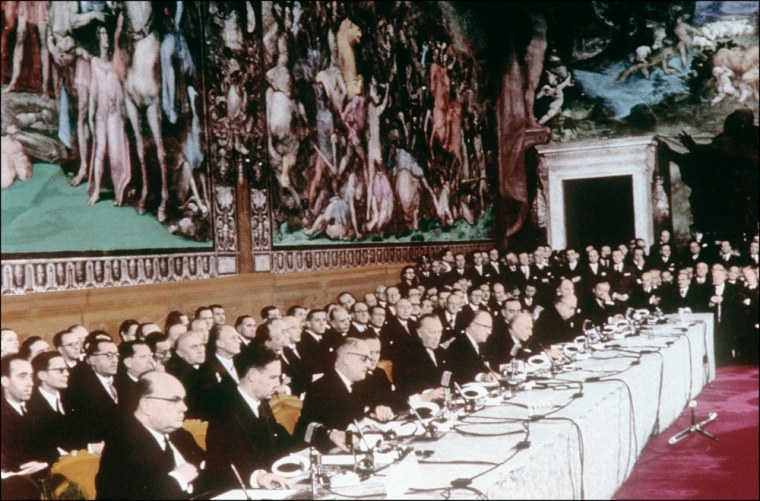The European Union was awarded the Nobel Peace Prize Friday for its efforts to promote peace and democracy in Europe, in the midst of the union's biggest crisis since its creation in the 1950s.
The award was given to the 27-nation bloc because it had "for over six decades contributed to the advancement of peace and reconciliation, democracy and human rights in Europe," Nobel committee chairman Thorbjoern Jagland said.
The committee praised the EU not only for rebuilding after World War II, but also for its role in spreading stability to former communist countries after the 1989 fall of the Berlin Wall.
"The stabilizing part played by the European Union has helped to transform a once torn Europe from a continent of war to a continent of peace," Jagland said.
The President of the European Parliament Martin Schulz responded to the Norwegian Nobel Committee announcement on Twitter, saying that the "EU is an unique project that replaced war with peace, hate with solidarity."
"Deeply touched honoured that the EU has won the Nobel Peace Prize. Reconciliation is what the EU is about. It can serve as inspiration," .
Read the here
Read more on the here
The EU rose from the ashes of World War II, born of the conviction that ever closer economic ties would make sure that century-old enemies never turned on each other again.
The idea began to take on a more defined shape when, on May 9, 1950, French Foreign Minister Robert Schuman proposed that France and the Federal Republic of Germany pool their coal and steel resources in a new organization that other European countries could join.
April fools joke?
Some in Europe greeted the announcement with derision.
"The Nobel committee is a little late for an April fool's joke. Twenty years ago this prize would have been sycophantic but maybe more justified. Today it is downright out of touch," Martin Callanan, the leader of the Eurosceptic Conservatives and Reformist Party in the European Parliament, told Reuters.
"Presumably this prize is for the peace and harmony on the streets of Athens and Madrid," he added sarcastically, in reference to the EU-backed economic austerity programs that have prompted sometimes violent protest in parts of Europe.
"The EU's policies have exacerbated the fallout of the financial crisis and led to social unrest that we haven't seen for a generation," Callanan said.
Others, however, praised the decision.
"This is great timing," professor Friedrich Heinemann, EU expert at the Center for European Economic Research (ZEW) in Mannheim, Germany told NBC News.
"I believe the Nobel Peace Prize is a helpful recognition for an institution that offers a solid framework for solutions to the present conflicts in Europe," he said.
"The European Union has created a form of stability and peace in Europe, which also provides the basis for economic stability in Europe," he added.
Norwegian public broadcaster NRK said an hour before the announcement that the EU would win.
The prize, worth $1.2 million, will be presented in Oslo on Dec. 10.
Related stories:
- Chinese author Mo Yan wins Nobel Prize in literature
- Nobel Prize awarded for stem cell breakthroughs
- How will Nobel Prize handle Higgs hassle?
- Yemen's 'Mother of the Revolution', Liberian president, peace activist share Nobel prize
Reuters and The Associated Press contributed to this report.
